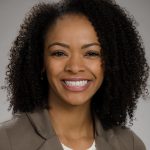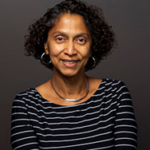By Jevay Grooms
 Kosali Simon is the Distinguished Professor of Public and Environmental Affairs at Indiana University. Jevay Grooms is an Assistant Professor of Economics at Howard University. This interview has been lightly edited for length and clarity.
Kosali Simon is the Distinguished Professor of Public and Environmental Affairs at Indiana University. Jevay Grooms is an Assistant Professor of Economics at Howard University. This interview has been lightly edited for length and clarity.
Jevay: You have been an active member of ASHEcon for some years. The website notes you are a member of the 2011-2012 ASHEcon Founders Circle. Over the last 10 years I imagine the organization has changed. What do you think is the most substantial or beneficial change you have observed during your time as a member?
 Kosali: I looked back over my records and found I have been a member since the inaugural ASHEcon meeting in June 2006 in Madison, Wisconsin—what a long time has passed! The biggest changes I have seen have been the growth of the size and recognition of the profession, and the incredible ingenuity and ambition in the research done by health economists. In the past, perhaps we were labor or public economists who also ask health questions, but now health is its own field. The recognition of what the economic profession brings to the health sector and the study of health more broadly are new.
Kosali: I looked back over my records and found I have been a member since the inaugural ASHEcon meeting in June 2006 in Madison, Wisconsin—what a long time has passed! The biggest changes I have seen have been the growth of the size and recognition of the profession, and the incredible ingenuity and ambition in the research done by health economists. In the past, perhaps we were labor or public economists who also ask health questions, but now health is its own field. The recognition of what the economic profession brings to the health sector and the study of health more broadly are new.
Also, how well-connected the profession seems to be today. As a new person navigating the health economics profession, I hope this means the entry path feels less daunting than it did.
Jevay: As President-Elect are there any initiatives or efforts you want to put at the forefront of your presidency?
Kosali: What’s great about this position is it is a 3-year term: President-Elect, President, and Past President. As a collective we work together to think of how to continue to push the future of the organization. I am grateful we have a strong set of past presidents, a well-functioning board, and a strong and supportive administrative office.
Speaking to David Cutler, Kate Bundorf, and David Slutsky (Executive Director), I’ve thought about what efforts I want to amplify that ASHEcon has been working on. I want to amplify what ASHEcon does in mentoring, including fundraising efforts for mentoring, push us further in efforts to increase diversity, and more openness. I would also like to increase training and produce training resources. For example, training in research communication and broader impacts, which takes all forms; how we visualize our graphs; how to speak to the media; how to be part of commissions, how to be colleagues outside of our departments. I’d also like to make the entry barriers lower for the use of novel data in research, regardless of your institution.
I’m also thinking about what our health-economics-adjacent fields are doing. What is being done outside of the US and is there an overlap to explore? What is happening in fields such as health services, international, development economics, climate and environment research that has an overlap with health economics? Are there places we haven’t reached where we can see benefits from exploring the overlap?
Jevay: At the Annual Conference in June in Austin, TX, in addition to all the barbecue I was able to consume, I had the pleasure of attending the Diversity Scholar Luncheon. During the event you spoke of increasing diversity among health economists in general but also their representation in the organization. I know this is a loaded question, but what are some of the greatest obstacles to increasing diversity in the profession?
Kosali: First, we need to think about the pipeline very early on. Let’s really think about how we are mentoring our undergraduate students. Beyond that, I think we need to conduct outreach to high school students, particularly by ensuring they understand you can use economics to solve real-world issues. You can achieve some of these social impact goals via economics. It is also important to showcase how professors can impact social policies in very different ways.
We need institutions and departments taking on more early outreach initiatives, such as summer programs that some programs are already doing. We can learn from them.
Jevay: Do you have any suggestions on how members can help address the lack of diversity in the profession?
Kosali: Let’s learn from other organizations which have been very successful, such as AcademyHealth.
Jevay: Switching gears, a little: I have had the pleasure of knowing you for the last five plus years and with that came mentorship, guidance, and genuine interest in my work and my development in the profession. What does mentoring mean to you?
Kosali: Mentoring is a two-way relationship. It often sounds as something charitable, but mentors themselves gain a lot from knowing the topics and people at the forefront of what drives new research. It’s a two-way relationship because everyone is always being mentored and mentoring.
It’s never too early to start developing your mentoring philosophy and it’s never too late to be mentored.
Jevay: I’m sure you have had some exceptional mentors during your career. Is there one piece of advice that has stuck with you throughout the years, or that you have held dear since early in your career?
Kosali: Someone once told me, “You are working towards progression in your career and in the field, not just your department. That really stuck with me, and I have enjoyed getting to network within wider and wider circles while being also grounded in my own department.
Jevay: Before I end this interview, it would be a disservice if the readers didn’t get a chance to learn a little more about their President-Elect outside of the profession. Could you answer the following questions?
- What is your favorite activity?
- Art, and making crafts, cooking, and painting. My mom is an art teacher.
- What is your favorite dish or item to eat?
- Recently my 11-year-old has been experimenting with gourmet ice cream. My favorite is the rosewater pistachio ice cream.
- You are banned from working for two weeks; where are you going or what are you doing?
- Hmm, so many places I would like to go. But most of all—I would like to take my kids to Zambia where I spent part of my childhood.
Jevay: Before we finish the interview is there anything you want to share with the readers that I didn’t touch on?
Kosali: Having looked back through old emails and conference documents to see when was the first ASHEcon conference I went to, it’s so wild for me to think I am President-Elect now. I’m grateful to have this opportunity!
Jevay: Thanks, Kosali, for your time, and I’m sure I am not alone when I say thank you for your commitment to the profession and service in the organization. We look forward to the many ways you will help shape ASHEcon as President-Elect.
